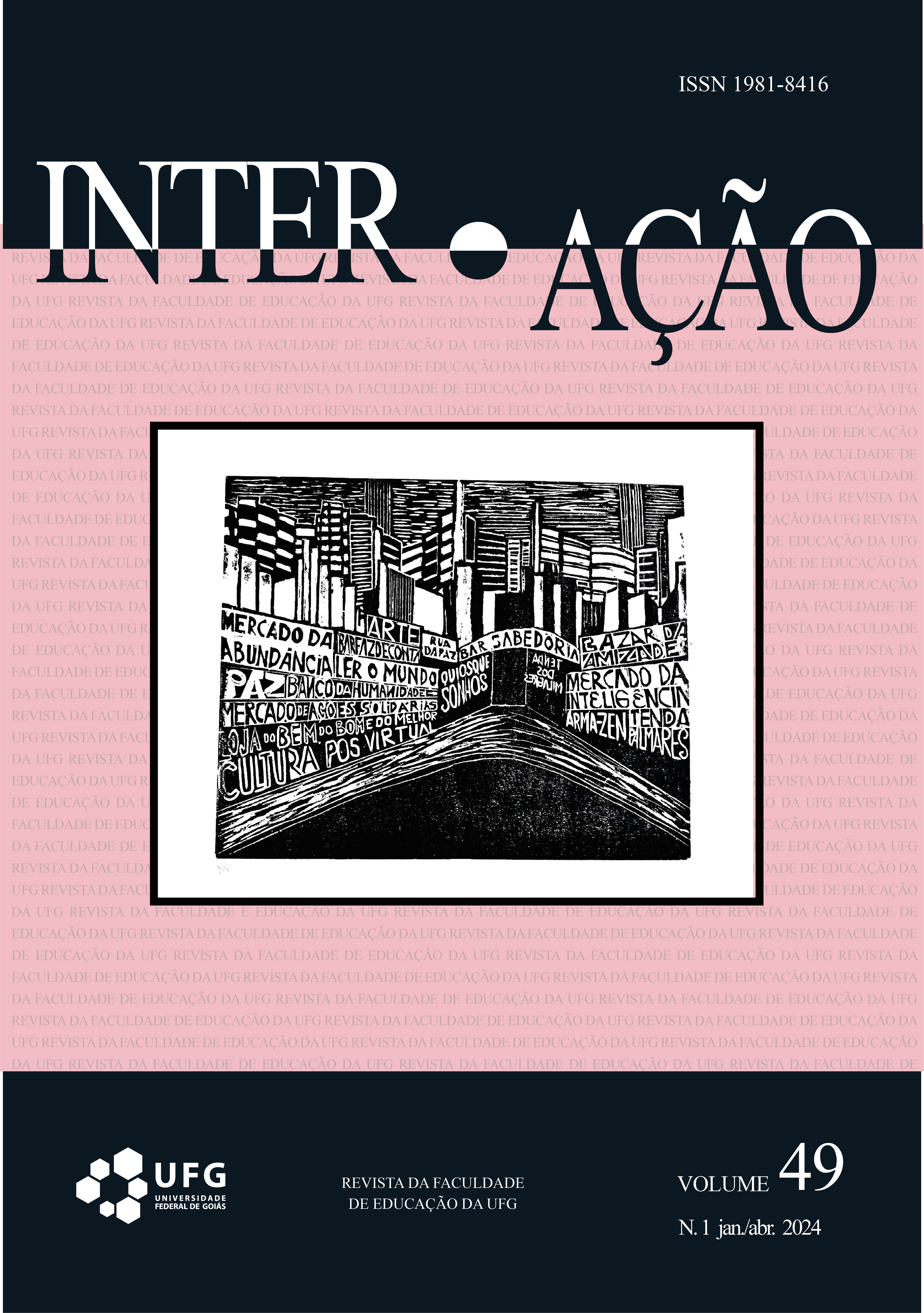THE LOCAL CURRICULUM AS A STRATEGY TO PROMOTE CULTURAL DIVERSITY IN MOZAMBIQUE
DOI:
https://doi.org/10.5216/ia.v49i1.76111Keywords:
Local Curriculum; Multiculturalism; Education; Diversity.Abstract
This paper seeks to understand the extent to which the local curriculum impacts on the appreciation of cultural diversity, aiming to elucidate the relationship between the local curriculum and cultural diversity in the Mozambican school environment. Therefore, bibliographical research was carried out, highlighting Sengulane (2022), Nivagara (2018), Santos (2018), Zanin and Lemke (2017), Ibraimo and Cabral (2015), Santiago (2012), Dias (2010) and Capece (2005). A product of this research was the understanding that the teacher must be able to enhance, through the local curriculum, the cultural diversity of students, in favor of raising the quality of teaching and learning, and the need for educators to create, in fact, the practice of diversity in teaching and not contenting itself with valuing it discursively.
Downloads
References
AGOSTINHO, A. A. Manual de apoio ao professor: sugestões para abordagem do currículo local: uma alternativa para a redução da vulnerabilidade. Maputo: Inde, 2011.
CAPECE, J. A. A Interdisciplinaridade e a Prática pedagógica em Moçambique. Revista E-Curriculum, São Paulo, v. 1, n. 1, 2005. Disponível em: https://revistas.pucsp.br/index.php/curriculum/article/view/3091. Acesso em: 10 nov. 2022.
DENZIN, N. K.; LINCOLN, Y. S. The Sage handbook of qualitative research. 4. ed. Los Angeles: Sage, 2011.
DIAS, H. N. Diversidade cultural e educação em Moçambique. V!RUS, São Carlos, n. 4, 2010. Disponível em: http://www.nomads.usp.br/virus/virus04/?sec=4&item=4&lang=pt. Acesso em: 30 maio 2022.
GEERTZ, C. A interpretação das Culturas. Rio de Janeiro: Zahar Editores, 1978.
IBRAIMO, M. N.; CABRAL, I. Currículo local: entre a retórica do prescrito e a realidade concreta. In: SEMINÁRIO INTERNACIONAL EDUCAÇÃO, TERRITÓRIOS E DESENVOLVIMENTO HUMANO, 1., 2015, Porto. Anais [...]. Porto: Universidade Católica Portuguesa, 2015. v. II (Comunicações Livres), p. 1022-1034. Disponível em: https://repositorio.ucp.pt/bitstream/10400.14/19563/1/Currículo%20local%20–%20entre%20a%20retórica%20do%20prescrito%20e%20a%20realidade%20concreta.pdf. Acesso em: 4 dez. 2023.
LAKATOS, E. M; MARCONI, M. de A. Fundamentos de metodologia científica. 5. ed. São Paulo: Atlas, 2003.
MERRIAM, S. B.; TISDELL, E. J. Qualitative research: A guide to design and implementation. 4. ed. Nova Jersey: John Wiley & Sons, 2015.
MOÇAMBIQUE. Assembléia da República. Lei nº 18, de 28 de dezembro de 2018. Maputo: Assembléia da República, 2018. Disponível em: https://mept.org.mz/wp-content/uploads/2020/02/Lei-nº-18-2018-28-Dezembro_-SNE.pdf. Acesso em: 5 maio 2023.
MOÇAMBIQUE. Instituto Nacional de Desenvolvimento da Educação (Inde). Estratégias de implementação do novo currículo. Maputo: Inde, 2003.
NIVAGARA, D. D. O currículo local como política para a preservação e/ou transformação da cultura rural (do campo). Revista AMAzônica, [s. l.], v. XXI, n. 1, 2018. Disponível em: https://periodicos.ufam.edu.br/index.php/amazonica/article/view/4722/3829. Acesso em: 3 dez. 2023.
NOGUEIRA, J. K.; FELIPE, D. P.; TERUYA, T. K. Conceitos de gênero, etnia e raça: reflexões sobre a diversidade cultural na educação escolar. In: FAZENDO GÊNERO: CORPO, VIOLÊNCIA E PODER, 8., 2008, Florianópolis. Anais […]. Fortaleza: Universidade Federal de Santa Catarina, 2008. Disponível em: https://nt5.net.br/publicacoes/Nogueira-Felipe-Teruya_01.pdf. Acesso em: 5 maio 2023.
ORGANIZAÇÃO DAS NAÇÕES UNIDAS PARA A EDUCAÇÃO, A CIÊNCIA E A CULTURA (UNESCO). Declaração Universal sobre a Diversidade Cultural. Paris: Unesco, 2001.
RODRIGUES, P. C. R. Multiculturalismo: a diversidade cultural na escola. 2013. 146 f. Relatório de Atividade Profissional (Mestrado em Ensino do 1º Ciclo do Ensino Básico) – Escola Superior de Educação João de Deus, Lisboa, 2013. Disponível em: https://comum.rcaap.pt/bitstream/10400.26/3683/1/PaulaRodrigues.pdf. Acesso em: 30 maio 2022.
SACRISTÁN, J. G. O Currículo: uma reflexão sobre a prática. Porto Alegre: Artmed, 2000.
SANTIAGO, E. Cultura Moçambicana. In: INFOESCOLA. Florianópolis, 2012. Disponível em: https://www.infoescola.com/cultura/cultura-mocambicana/. Acesso em: 9 jul. 2022.
SANTOS, P. C. S. Tipos de multiculturalismo e os limites que decorrem das diferentes concepções da cultura. In: COLÓQUIO INTERNACIONAL EDUCAÇÃO, CIDADANIA E EXCLUSÃO (CEDUCE), 5., 2018, Niterói. Anais […]. Capina Grande: Realize Editora, 2018. Disponível em: http://www.editorarealize.com.br/editora/anais/ceduce/2018/TRABALHO_EV111_MD4_SA9_ID221_15032018195926.pdf. Acesso em: 12 jul. 2022.
SENGULANE, H. Teorias do Currículo. Maxixe: UniSave, 2022.
SILVA, F. S. Breve reflexão sobre a relação entre cultura e educação. In: WEB Artigos. [s.l.], 2017. Disponível em: https://www.webartigos.com/artigos/breve-reflexao-sobre-a-relacao-entre-cultura-e-educacao/153746. Acesso em: 31 maio 2022.
TAKAHASHI, T. Diversidade Cultural e Direito à Comunicação. In: SORIANO, J. Blog Historia de internet en América Latina y el Caribe contada por sus protagonistas. [S. l.], jan. 2007. Disponível em: https://interred.wordpress.com/2007/01/17/diversidade-cultural-e-direito-a-comunicacao/. Acesso em: 16 mar. 2023.
ZANIN, F. A.; LEMKE, C. K. Teoria multicultural em trabalhos acadêmicos e sua relação com as práticas pedagógicas. Educação, Santa Maria, v. 42, n. 2, p. 347-360, 2017. Disponível em: https://periodicos.ufsm.br/reveducacao/article/view/22998. Acesso em: 5 maio. 2023.
Published
How to Cite
Issue
Section
License
Copyright (c) 2024 Laurentino Américo Nhacuongue, Carlos Alberto Vasconcelos

This work is licensed under a Creative Commons Attribution-NonCommercial 4.0 International License.
Inter-Ação uses the Creative Commons Attribution 4.0 License for Open Access Journals (Open Archives Initiative - OAI) as the basis for the transfer of rights. Open access means making documents available on the Internet free of charge, so that users can read, download, copy, distribute, print, search, or link to the full text of documents, process them for indexing, use them as input data for software programs, or use them for any other lawful purpose, without financial, legal, or technical barriers.
Authors publishing in this journal agree to the following conditions:
1) Authors retain copyright and grant the journal the right of first publication, with the work simultaneously licensed under the Creative Commons Attribution License, which permits redistribution of the work with attribution and first publication in this journal.
2) Authors are permitted to enter into additional, separate agreements for non-exclusive distribution of the version of the work published in this journal (e.g., for publication in an institutional repository or as a book chapter), with attribution and first publication in this journal.
3) Authors are permitted and encouraged to publish and distribute their work online (e.g. in institutional repositories or on their home page) at any time before or during the editorial process, as this may generate productive changes as well as increase the impact and citation of the published work.















